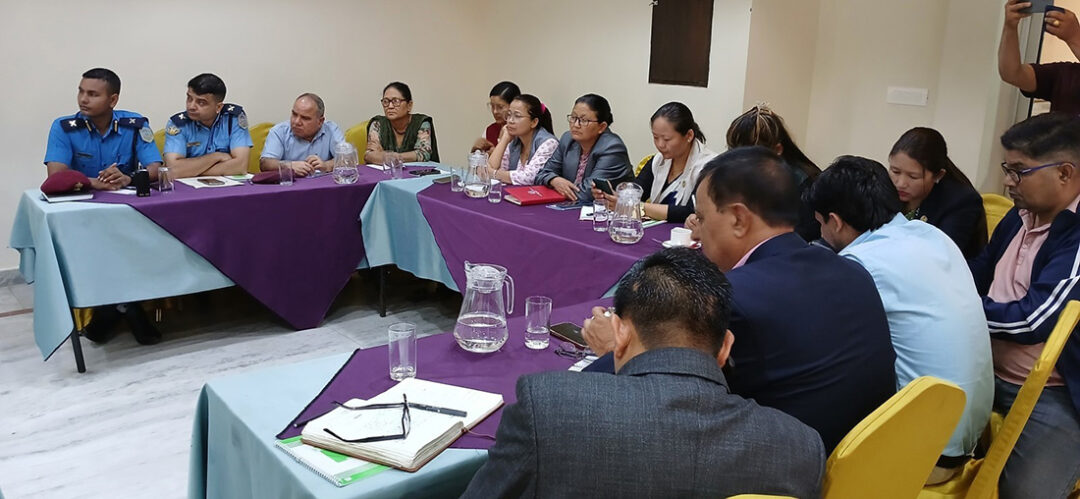A man torn from his home and forced to join the Russian Army, Nepalis held hostage for nine harrowing months in Kenya, Nepali youth exploited by traffickers in online scams, and young girls lured to work in Nepal’s adult entertainment sector. For most of us, these dreadful stories of human trafficking are just fleeting headlines, but the anguish of the survivors is real, and they need immediate and concrete solutions.
In 2019, Nepal’s National Human Rights Commission estimated that 1.5 million Nepalis were vulnerable to human trafficking. The commission’s 2022 Trafficking in Persons Report found a growing risk of human trafficking in all seven provinces and for people of all genders. The report underscored the ongoing exploitation of Nepalis in the adult entertainment sector, as laborers at brick kilns, and in organ trafficking operations both domestic and international. It also detailed forced marriages in China and labor exploitation of Nepali men and women in the Middle East, Africa, and Europe.
Yet, from 2019 to 2021, just 270 trafficking cases were registered with the Nepal police and 1,179 cases with the judiciary. This is a significant gap. It reflects shortcomings in both law and procedure that hinder the prosecution of traffickers and deprive their victims of legal redress and compensation.
Demoted to the Tier 2 Watchlist
The United States’ 2024 Trafficking in Persons Report has downgraded Nepal from Tier 2 status to the Tier 2 Watch List, noting the country’s failure to criminalize all forms of labor and sex trafficking, prosecute traffickers, finalize victim identification and referral procedures, initiate victim compensation, or hold fraudulent labor recruiters accountable. The government has also failed to protect Nepali migrants abroad. Tier 2 Watch List countries that fail to meet specific benchmarks face a further downgrade to the Tier 3 category. If this happens to Nepal, the country may lose access to non-humanitarian and non-trade-related foreign assistance from multilateral development banks and the International Monetary Fund. Given these dire consequences, addressing the country’s human trafficking issue should be a top priority for the government.
One key recommendation provided by the U.S. report is to amend national anti-trafficking law to conform to the United Nation’s Palermo Protocol on sex and labor trafficking. This year, 2024, marks the fourth year since Nepal ratified the Protocol, yet the country has not fulfilled its post-ratification obligations. The delay has deprived the justice sector and other service providers of tools they need to address human trafficking, while casting a long shadow over the lives of survivors.
Changing the law

Several national laws need to be amended, including the 2007 Human Trafficking and Transportation Control Act (HTTCA), the 2007 Foreign Employment Act (FEA), the Organized Crime Prevention Act (2014), the Immigration Act (1992), the Labor Act (2018), the Mutual Legal Assistance Act (2014), the Child Labor (Prohibition and Regulation) Act (2000), the Extradition Act (2014), the Children Act (2018), and the Country Criminal Code (2017).
Among these, the HTTCA and the FEA are most in need of reassessment and revision. The HTTCA defines human trafficking narrowly and fails to recognize the use of force, fraud, or coercion as essential elements of the offense. This confuses human trafficking and human smuggling, creating serious enforcement problems—trafficked persons are considered crime victims under international law; smuggled persons are not. The Act also lacks provisions for foreign victims of human trafficking, despite increasing evidence that Nepal is a destination for trafficked persons. Additionally, the Act often uses derogatory terminology for the victims of sex trafficking, contributing to their “re-traumatization” and “re-victimization.”
In 2023, Nepal introduced a bill for the “prevention of money laundering and promotion of [the] business environment” to reform 20 statutes, including the HTTCA. While the overall amendment process was important to demonstrate Nepal’s stance against money laundering and terrorism financing, the bill once again confused human trafficking and smuggling.
Similar problems afflict the FEA, which fails to adequately address the trafficking of Nepali labor migrants. The Palermo Protocol defines labor trafficking as a crime involving the recruitment, transportation, transfer, harboring, or receipt of individuals through fraud, deception, abuse of power or position of vulnerability, and exploitation for forced labor, slavery, or servitude. These elements are clearly visible in the experiences of Nepali migrants, who face fraudulent recruitment, high fees, unpaid wages, irregular working hours, and various forms of abuse at the hands of recruiters and employers. Some are even coerced into using informal channels to obtain foreign employment. The current FEA merely treats this phenomenon as fraud when, in fact, it involves various components of human trafficking.
